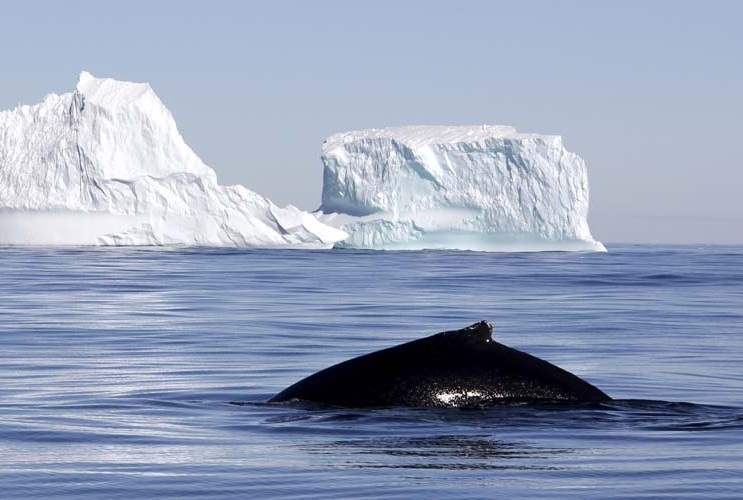
聆听北冰洋
Arctic Marine Mammals Swim Up to the Microphone
聆听北冰洋
As Arctic sea ice melts, an underwater recording project reveals that the submerged ecology is undergoing change, with humpbacks and killer whales staying north later in the year.
伴随着北冰洋的浮冰融化,一项水下录音研究向我们展示了水下的生态环境正在变化,座头鲸和杀人鲸也会在北方逗留至年尾。
撰文/播音 Christopher Intagliata
翻译 M
审校 邰伦玥
"My colleagues and I always joke that one of the Jacques Cousteau movies starts out with something like 'the ocean is a silent place.'" [Le Monde Du Silence clip: "Le monde du silence…"] And, you know, it's anything but silent." [bowhead whale and bearded seal sounds]
“我和我的同事一直拿雅克·库斯托一部电影的开头来开玩笑——海洋是安静的。但你们懂的,那是个包罗万有而独缺宁静的地方。”
Kate Stafford is a biologist and oceanographer at the University of Washington. And she and her colleagues have been cataloguing that soundscape of the deep—like these bowhead whales and bearded seals. They’re using an array of underwater microphones near the Bering Strait, a natural choke point for underwater traffic headed from the Pacific to the Arctic and back. And in some ways, she says, listening is a better way to census the Arctic than seeing. "You can record sounds underwater at night, in high wind, during ice cover. So we're able to eavesdrop all year round. And you can hear animals much further underwater than you could, say, see them from the surface of the water."
凯特·斯塔福德是华盛顿大学的生物学与海洋生物学家。她和她的同僚一直在做深海录音的分类工作,比如说座头鲸与长须鲸的声音。他们在白令海峡附近安装了一排麦克风。白令海峡是太平洋与北冰洋之间天然交通的枢纽。凯特认为,统计海洋生物的数量,有时候在北冰洋下聆听比观察统计更有效。“无论是在晚上,在强劲的海风下,还是在浮冰的覆盖下,你都能录下音。因此我们能够无时无刻地偷听到水下的声音。通过录音,你能听到的深海动物声音是远不能从海面上观察到的。”
But in the last five years of underwater recordings, Stafford says, no two years have been the same in terms of which species they hear, and when they hear them. And as arctic ice retreats, species like humpbacks and killer whales are staying north longer—as late as early November—which she says would not have been possible just a few decades ago. They even found humpbacks singing mating songs up in Arctic waters [humpback singing]—which they used to think happened only down in tropical breeding grounds. The team presented these findings November 2 at a meeting of the Acoustical Society of America, in Jacksonville, Florida. [Kathleen Stafford, Summer and winter whales in the Pacific Arctic]
然而,凯特说在过去5年的录音中,听到的动物种类和听到的时间没有一年是相同的。并且,伴随着北冰洋的浮冰消减,一些物种,比如座头鲸与杀人鲸,在北方停留了更长的时间——差不多到了11月的上旬——这种现象在几十年前不可能发生。他们甚至发现了座头鲸在北冰洋中唱起了求偶的调子【座头鲸的声音】,在过去,他们认为这种状况只会发生在热带的繁衍地。在11月2日在佛罗里达的杰克逊维尔举行的美国声学学会会议上,凯特的团队展示了这些发现。
"If polar bears and walrus might be the ecological losers as it were in terms of sea ice loss, a lot of the larger whales seem to be taking advantage of this system. It's a really good time to be a bowhead, as a colleague of mine says." But uncertainty is the name of the game with Arctic change. We’ll see if it continues to be a good time to be a bowhead as more and more sub-Arctic whales move north to compete in Arctic waters.
“在海洋浮冰消退的生态变化现状下,北极熊与海象似乎吃尽了苦头,而大量的大型鲸类则似乎占了便宜。我的一个同事说,这时候做一只座头鲸可真好啊。”然而,北冰洋变化带来的不确定性才是最关键的因素。随着亚北极圈的鲸类加入到北极圈水域内,更多竞争将会出现,到那时,座头鲸的好日子是否会持续下去呢?
未经书面许可任何人不得复制或镜像
京ICP备11000850号-1
 京公网安备11010502039775号
京公网安备11010502039775号 信息网络传播视听节目许可证0111611号
国家科技基础条件平台

















